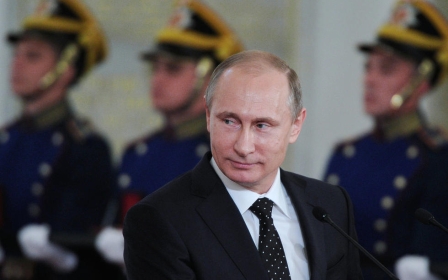Syria field hospitals forced to close by intense government bombing

Bombing by government forces in southern Syria has forced four field hospitals to close, with medical workers among those injured by recent bombings, monitors say.
On Wednesday an airstrike in the village of Saida just east of Deraa city, aimed at a checkpoint held by the rebel group Jaish al-Yarmouk, killed three fighters and a medical worker at a nearby field hospital, the Syrian Observatory for Human Rights (SOHR) said on Thursday.
Activists from Saida published footage claiming to be from the scene of the second of two attacks to target the small town on Wednesday, showing a huge crater in the middle of a residential street.
A local resident, Mamoon Aloush, wrote on Wednesday that the local field hospital had been shut down following the attacks, due to “the repeated bombings in the area around the facility”.
The hospital ceased taking in patients on Wednesday afternoon, but put out an urgent call asking local residents with cellars in their homes to “donate” them so that medical workers could continue treating people.
Rami Abdel Rahman of the British-based SOHR said the facility in Saida was the fourth field hospital in Deraa province to shut down in the space of seven days, in the midst of concentrated attacks by forces allied to President Bashar al-Assad.
A hospital in Eastern Ghariya, a small town just north of Saida, announced on Wednesday that it would close its doors amid “continual targeting by Assad’s forces”.
The hospital closures come as activists warn that nearby Jordan is closing its borders to wounded Syrian civilians.
Opposition activists in Deraa said on Wednesday that two civilians, a man and a woman, died on the border between Syria and Jordan after Jordanian authorities refused to allow them to cross.
According to the activists, the pair were severely injured when Syrian government planes launched internationally-proscribed barrel bombs on the small town of Tafas some 10 kilometres northeast of the border with Jordan.
Fighting in the town and surrounding province of Deraa has intensified since armed rebels began Storm of the South, a large-scale military operation aimed at establishing full control of the area.
A source from the Southern Front of the Free Syrian Army, which is playing a key role in the offensive, told MEE last week that some 3,000 fighters from a broad-based rebel coalition were taking part in the operation.
Exclusive footage of the battles obtained by MEE showed the carnage left after bouts of heavy fighting in the centre of Deraa city, which was home to around 100,000 people before the uprising began in 2011.
Since the beginning of the operation, a steady stream of injured fighters and civilians have been transported to al-Ramtha, a Jordanian town of some 120,000 just over the border.
Five fighters died earlier this week in al-Ramtha Hospital, where Medecins Sans Frontieres (MSF) has established a special clinic to deal with people injured across the border in Syria.
Fears about the closure of hospitals and borders in the region came after MSF this week warned that the efforts of medical teams in northern Syria were being severely hampered by fuel shortages.
The organisation, one of few aid groups still operating within Syria, said energy shortages were causing "widespread disruption" at health centres in the north of the country, warning that the lives of Syrians are in "even greater danger" with many hospitals unable to source fuel to run water pumps, operate incubators for newborn babies and send ambulances out to deliver essential first aid.
Stay informed with MEE's newsletters
Sign up to get the latest alerts, insights and analysis, starting with Turkey Unpacked
Middle East Eye delivers independent and unrivalled coverage and analysis of the Middle East, North Africa and beyond. To learn more about republishing this content and the associated fees, please fill out this form. More about MEE can be found here.




